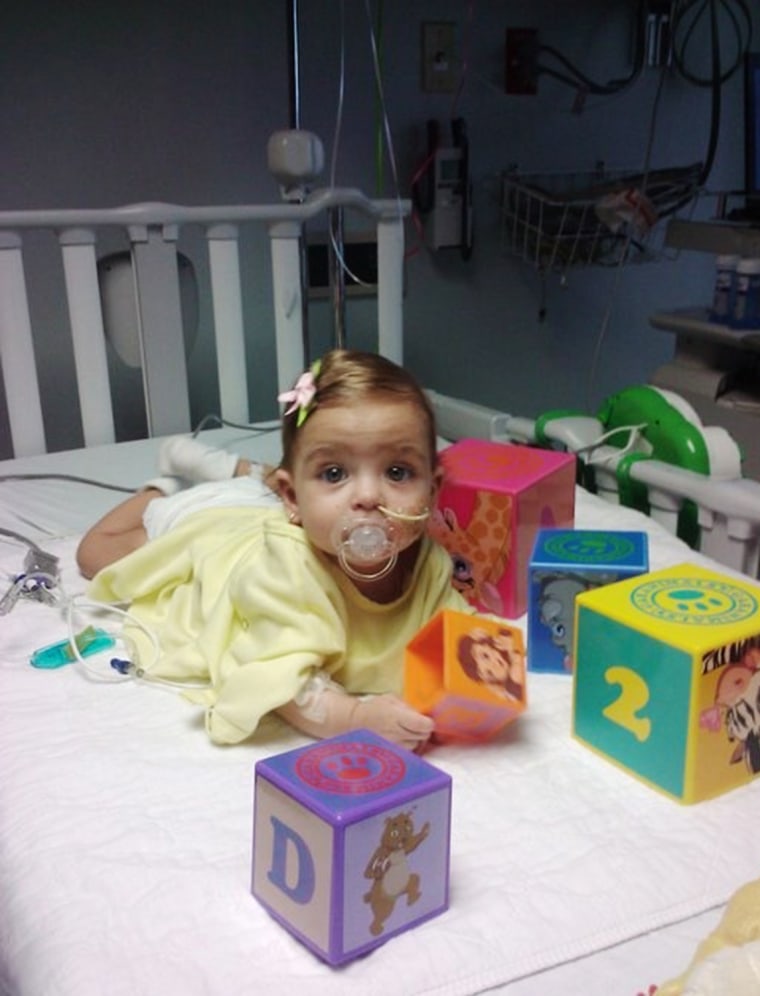Karina and Jesus DeLeon credit public cord blood donations and the help of forward thinking doctors for saving their daughter.
Valentina, now 7-years-old, was a healthy baby for the first five months of her life, but her health quickly deteriorated after her mother, Karina, stopped breastfeeding. The baby developed digestive issues and a severe lung infection at 9 months.
The couple from Pharr, Texas had unsuccessfully tried to have a baby for 10 years and feared they would lose their little girl.
“I knew that something was wrong because she had a low-range fever every single day, she wasn't keeping any of her medication or formula down. I just knew as a mom that my baby was wasn't right,” said Karina. “We took her to the hospital and a specialist ran all these different tests and everything came up abnormal."
The diagnosis and prognosis were grim. A series of blood tests and a bone marrow biopsy revealed that Valentina had Severe Combined Immunodeficiency (SCID), a rare genetic disorder in which the immune cells don’t function properly. Valentina was given a 30 percent chance of survival.
Related: Is Cord Blood Banking Worth the Cost? Here’s What the Experts Say
“She had no immune system,” said Karina. “She could die from any viral infection. They told us the only thing that could make her be a normal baby was a bone marrow transplant, but she had no siblings.”
In a desperate search for a bone marrow match, the DeLeon’s turned to a public cord blood bank in San Antonio.

Cord blood contains hematopoietic stem cells — cells that can turn into any type of blood cell. When these cells are transplanted into the bone marrow they become functional cells that can cure diseases, such as blood disorders, immune deficiencies, metabolic diseases, some kinds of cancers, and even rare genetic diseases such as the one threatening Valentina's life.
The cord blood procedure is completely safe for the baby, doesn’t affect labor or delivery, and the DNA sample needed to obtain a match can be acquired with just a simple swab test. Parents need only to notify the obstetrician of there desire to donate. If there is no known family history of genetic disease, donating the cord blood that would otherwise be thrown out to public cord blood banks so it can be used by families who desperately need it.
Cord blood — taken from the placenta of healthy newborn infants — is discarded 95 percent of the time, according to the American Academy of Pediatrics, even though experts know that the blood is an excellent source of stem cells that could help treat and, possibly, cure up to 80 different diseases.
"Just donate it. It’s love that you're giving to another family like us."
This week, the AAP released a new policy urging public cord blood donation. Private cord banks charge families a placement fee of $1,350 to $2,300 and an annual maintenance fee of $100 to $175 to store their baby's cord blood stem cells, which can be used if the child is later diagnosed with a disease. But public cord banks are free.
“In public banking there's a much greater chance that the blood will actually be used to treat conditions," says Dr. Joanne Stone, Maternal Fetal Medicine Specialist at Mount Sinai Health Care in New York. "In private banking it can only be used by that one family, and the chance of using it that way is much less than the chance of using it in a public bank.”
Parents like the DeLeons benefit when other parents generously give to public banks.
“Just donate it,” says Karina. “It’s love that you're giving to another family like us.”
For more information go to BeTheMatch.org